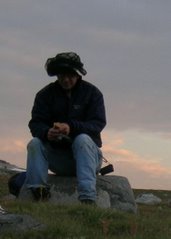
Nat. Geo. with the Neanderthals...then early civilization...mesopotamian....then the Neanderthals...didn't watch either too close...trying to make a clip of Hugin and Munin...which would be really really neat except it has friends voices in it...the Ravens...and the conversations...about the elections and the war clouds between Venezuela and Colombia...make the clip...heck...I dont know what to do with it...it's really neat...anyway...how did Gaia get in the Nat Geo story?...brb...
this from another site...
quote
Almost thirty years ago, Lovelock published Gaia: A New Look at Life on Earth, the first of his Gaia series that argues that life on our planet unconsciously acts in concert to regulate Earth's climate so that it remains within parameters favorable to the biosphere's health. Gaia created a firestorm of criticism from conventional scientists, perhaps partially because of the literary allusion of its name. Gaia was the Mother Earth goddess to the Greeks, a naming suggestion given to Lovelock by his Cornwall neighbor, the novelist William Golding (Lord of the Flies and The Inheritors). The hard-headed materialsists saw Gaia as mythopoetry, and their cynicism was probably confirmed as ecological romantics of the Eighties adopted Gaia as a kind of naturopathic faith.
unquote
Dont know but Gaia might smite the hard-headed materialists!
Graves wrote the White Goddess in 1948...published...brb...
quote
Gaia is believed by some sources (Joseph Fontenrose 1959 and others) to be the original deity behind the Oracle at Delphi. She passed her powers on to, depending on the source, Poseidon, Apollo or Themis. Apollo is the best-known as the oracle power behind Delphi, long established by the time of Homer, having killed Gaia's child Python there and usurped the chthonic power. Hera punished Apollo for this by sending him to King Admetus as a shepherd for nine years.
unquote
Oh..I want to get to Oracles and Delphi and Apollo's ...but a look at chthonic...brb...oh...sometimes when I'm reading wiki's take on the bygone beliefs it's a little like seeing how Egyptian Gods are portrayed in Star Gate...and the Greek's in Xena!...which I miss...
Well..the Gaia search is running into all kinda plop...for another time...the Neanderthals put flowers in their graves...I think...brb...
quote
One of the most interesting burial sites contained remains that had been carefully placed in the fetal position on a bedding of woody horsetail, a regional plant. This particular Neanderthal was also buried with several varieties of flowers. Leaky stated that the flowers were arranged deliberately as the body was being covered. Apparently the family and friends of the deceased gathered the distinct species of flowers, carried them to the grave, and carefully placed them on the body.
unquote
looks to be a nice site....and the quote a good sense of chtonic....and dont know why Nat. Geo. didn't have this bit...now for Delphi...brb....
quote
The priestess of the oracle at Delphi was known as the Pythia. Apollo spoke through his oracle, who had to be an older woman of blameless life chosen from among the peasants of the area. The sibyl or prophetess took the name Pythia and sat on a tripod seat over an opening in the earth. When Apollo slew Python, its body fell into this fissure, according to legend, and fumes arose from its decomposing body. Intoxicated by the vapors, the sibyl would fall into trance, allowing Apollo to possess her spirit. In this state she prophesied. She spoke in riddles, which were interpreted by the priests of the temple, and people consulted her on everything from important matters of public policy to personal affairs.
H.W. Parke writes that the foundation of Delphi and its oracle took place before the times of recorded history and its origins are obscure, but dating to the worship of the Great Goddess, Gaia.[8
H.W. Parke writes that the foundation of Delphi and its oracle took place before the times of recorded history and its origins are obscure, but dating to the worship of the Great Goddess, Gaia.[8
unquote
Now the Forest Elephants...if I remember right elephants use low resonance sound...the earth as a drum...brb...
quote
In 1997, O'Connell-Rodwell took this discovery in a bold, new direction by proposing that low-frequency calls also generate powerful vibrations in the ground - seismic signals that elephants can feel, and even interpret, via their sensitive trunks and feet.
unquote
and sorrow for their dead...
quote
Elephants pay homage to the bones of their dead, gently touching the skulls and tusks with their trunks and feet, according to the first systematic study of elephant empathy for the dead.
DavidDavid
Tree in the Door



No comments:
Post a Comment